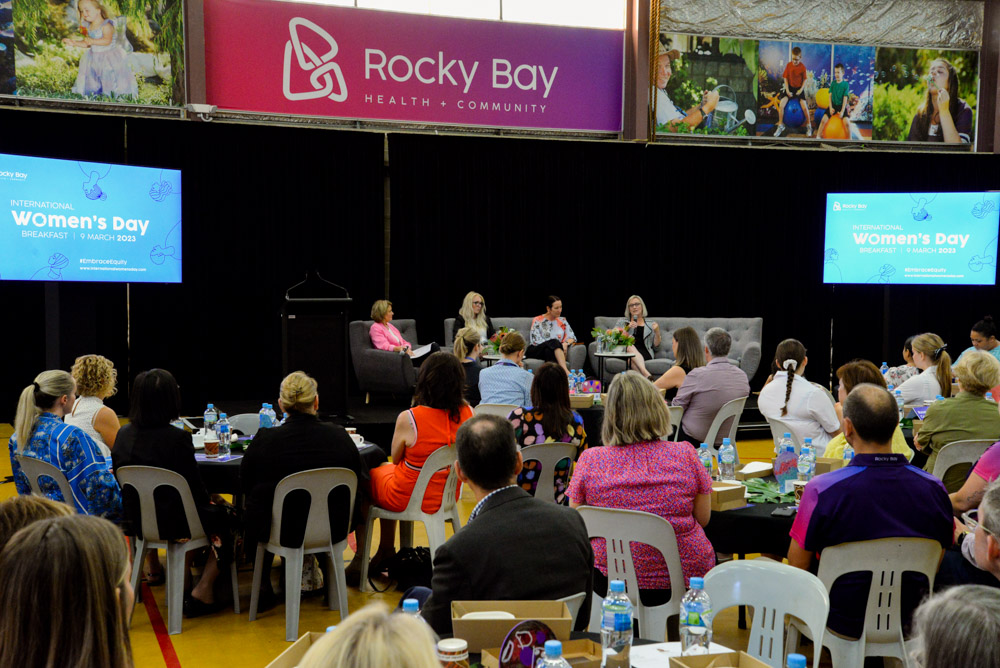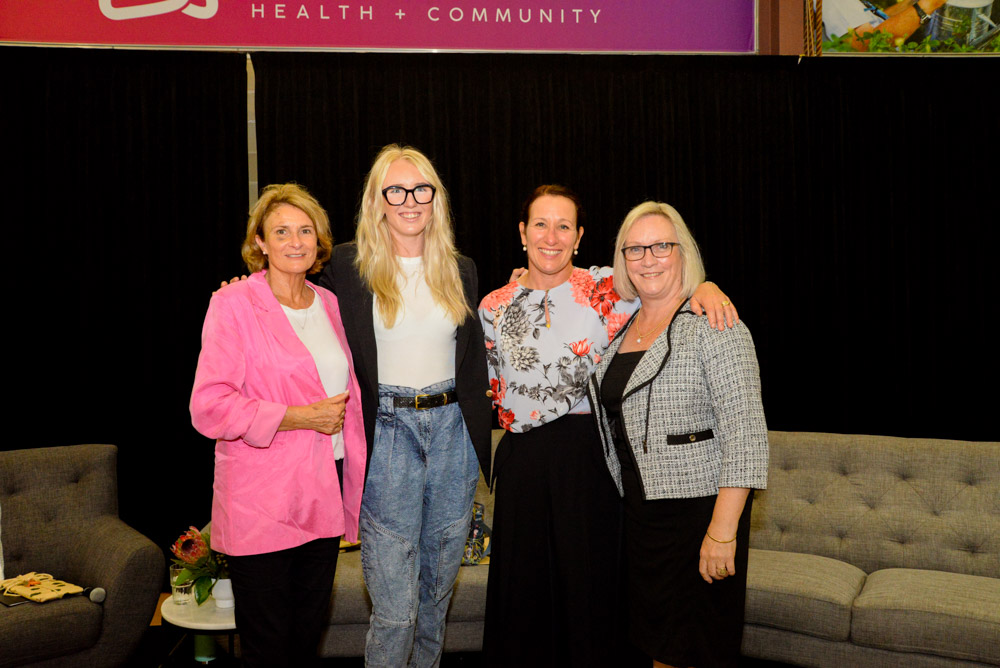(Above L-R: Rocky Bay Board Member, Miriam Borthwick, Wheelchair Basketballer Amber Merritt, CEO RUAH Community Services Debra Zanella, CEO Bightwater Care Group Catherine Stoddart)
Celebrations for International Women’s Day (IWD) were held at Rocky Bay on Thursday 9 March, with the sold-out breakfast event held at its Mosman Park hub with over 100 guests.
Sector peers, customers and staff attended Rocky Bay’s second IWD event which featured a panel discussion of professional women, including Chief Executive Officer of RUAH Community Services, Debra Zanella, Chief Executive Officer of Brightwater Care Group, Catherine Stoddart, and medal winning Wheelchair Basketballer, Amber Merritt.
Rocky Bay Board Member and experienced journalist, strategic communications and media relations professional, Miriam Borthwick, facilitated the panel discussion around this year’s IWD campaign theme of embracing equity.
The panel discussed many thought-provoking topics including equity in the workplace – particularly in the social services sector – the patriarchal model and the need for an alternative, professional stereotypes, the importance of understanding the issues of equity in order to help solve problems, and experience of people living with disability.
Amber, who was born with Unilateral Talipes Equinoveras and has undergone multiple surgeries, said she is not what most people would perceive to be an athlete with a disability, especially as she is extremely active and spends much of her daily life able to walk around.
“My parents ensured that I got the best opportunities in life possible, there was nothing I couldn’t do. They guided me and used their life experience to educate me…instead of trying to prevent me from doing things…they let me be myself and find my way through life.”
As a young girl, Amber experienced bullying due to her condition. She said although the experience helped to shape her as a person, education is still needed on the topic of disability.
“I’ve accepted I can’t change that narrative right now. We can educate a lot more around disabilities, inequalities, and differences in people, but that will take a lot of time. I’m so glad this happened to me because now I can look at situations and realise that what other people think or say about me…is actually none of my business. I am who I am, and I accept who I am,” says Amber.

Speaking on the topic of ambition and stereotypes in the health sector, Catherine shared her experiences of working in the National Health Service (NHS) in England, where she worked as Deputy Chief Nurse and Deputy Chief Executive at the Oxford University Hospital’s NHS Foundation Trust.
“Ambition used to be seen as an unattractive trait in women,” says Catherine.
“Part of ambition for me came by going to the NHS. I’d been Chief Nurse of Western Australia, and that’s a gender stereotype on its own – 92 per cent of nurses are female.
“I felt that I would not be able to step up in my career and wouldn’t be seen as anything other than a nurse…it just the environment that we were in.”
Catherine explained that the biggest growth she experienced was during her time at the NHS.
“(Working in the NHS) was the biggest exponential leap in my learning that I’ve ever had. I was on a board that was 50 per cent female, and the Chair was a woman who was a wonderful role model…I think that helped to shape what I expect of a Board.
“To take a step sideways and do something that’s different, the growth in that and reimaging yourself so you’re not the stereotype that people see you as, was just so empowering for me.”
Debra echoed these observations of equity in the health and community sectors.
“The thing that strikes me around equity in the (community services) sector is that over 75 per cent of our workforce are women, and I know that a lot of the women who work with us are experiencing issues where equity is really critical.
“People with lived experience, people from First Nations backgrounds, what we try to do at RUAH, and what we try to encourage in the sector, is to look at the context of the environment in which they come from and ensure the structures and processes are in place in our organisation to enable them to have equity and to flourish.”
Stereotypes exist as prominently in the community services sector as they do in the health sector, and Debra explained the importance of carers and caring, and how it is not valued as highly as it should be.
“The strongest and most life changing event is to care, fully, for another person. It enables, it creates hope, it is our future and yet (society) really don’t value the concept of care.
Debra Zanella
“In the social services sector we have a larger workforce than mining. We value GDP, but we don’t measure levels of resilience, or mental wellness, or levels of connectives. We have fiscal measures – which are important – but we don’t do the other.”
International Women’s Day was officially recognised on Wednesday 8 March.
Click here to watch a recording of Rocky Bay’s IWD event (skip to 11.30 to watch from the beginning).
